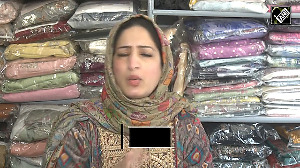 To compound the woes of those patients who have to rely on government health centres, the government has done little to enforce its order binding the doctors to prescribe generic rather than branded drugs.
To compound the woes of those patients who have to rely on government health centres, the government has done little to enforce its order binding the doctors to prescribe generic rather than branded drugs.
The Centre is reportedly going to shelve a plan to procure generic drugs for free supply to patients throughout the country.
This is a serious error.
Reportedly, states will instead be asked to do so; but, if a perceived inability to procure, stock and distribute these drugs is the reason for backtracking on the plan, how precisely will states be free of these constraints?
A few states, true, are already running their own schemes for providing free drugs from the government health centres.
But many among the others may not be capable of emulating them despite the Centre allowing them to access national health mission funds for this purpose.
In any case, decentralisation of generic drug sourcing -- done everywhere at the highest possible level -- would create more glitches than it is expected to do away with.
It would further widen the scope for leakages and other malpractices which are already rampant in the understaffed, under-resourced and ailing public health system.
Re-routing of the same medicines into the system would not be ruled out.
To compound the woes of those patients who have to rely on government health centres, the government has done little to enforce its order binding the doctors to prescribe generic rather than branded drugs.
That cosy relationships exist between some doctors and drug suppliers, fostering the prescription of brand-name drugs when cheaper generic alternatives are available, is well-known.
India is one of the world’s
Their greater use at home is imperative, given that between 50 and 80 per cent of out-of-pocket health expenditure is on drugs.
Official estimates indicate that nearly 40 per cent of those needing hospitalisation have to borrow money or sell assets to afford the costs. Besides, over 20 per cent of the sick do not seek medical help because they can’t afford the cost of medicines.
Thus, given the many merits of making generic drugs available free of cost, it is necessary to evolve a transparent and corruption-free system for procuring and dispensing them.
Information technology-based mechanisms for doing so are not difficult to conceive.
Working models exist: Tamil Nadu and Rajasthan have already put in place systems of online procurement of drugs directly from the manufacturers, besides creating the necessary infrastructure for warehousing and distribution of generic medicines.
These systems have by and large been effective, and resulted in a measurable increase in the number of users of public healthcare facilities.
These need to be scaled up to the national level, with a few more checks and balances if deemed necessary.
Involvement of local stakeholders in monitoring the stocking, allotment and handing out of the drugs can be one such measure aimed at further reducing the scope for misappropriation.
The use of Aadhaar-based biometric identification and digital recording of the beneficiaries may also be worth considering.
Simultaneously, effective measures are needed to enforce the mandatory prescription of medicines by their generic names by all doctors, public or private, to lower people’s out-of-pocket expenses on healthcare.
This will also force manufacturers of branded drugs to revisit their pricing policies.













 © 2025
© 2025